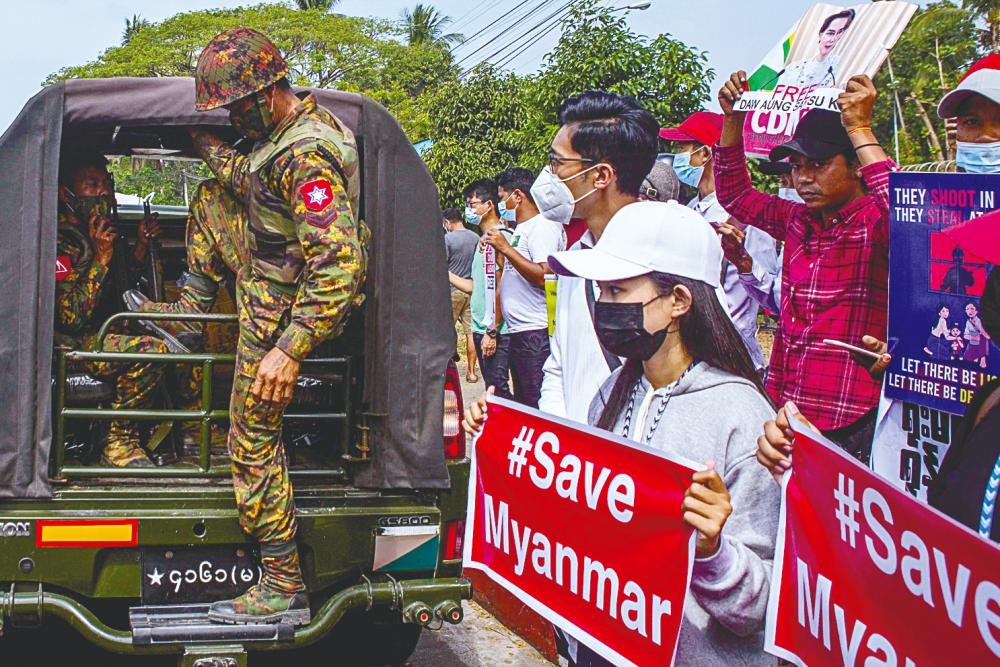THE European Union’s High Representative for Foreign Affairs and Security Policy, Josep Borell, said that “Europe is a garden” on Oct 13, 2022, at the European Diplomatic Academy in Bruges.
The rest of the world isn’t quite a garden, but we have made one.
The majority of the other planet is a rainforest.
Perhaps this explains why the rest of the world’s humanitarian issues haven’t gotten enough attention.
According to UN spokesperson Stephane Dujarric, the US$8.9 billion (RM39.3 billion) earned by the 2022 “Stand Up for Ukraine” worldwide pledging drive is “among the fastest and most generous donations a humanitarian flash appeal has ever received”.
However, there is a growing “aid deficit” for Afghanistan, Yemen, Gaza, Ethiopia and the Sahel.
The Rohingya genocide, which is acknowledged as the largest and fastest refugee influx since the Rwandan genocide in 1994, has likewise received less attention over time.
The Rohingya communities scattered across the western part of Myanmar’s Rakhine State came under a ruthless bombardment from the country’s military in 2017.
A few days later, the head of the UN Agency for human rights described the military’s actions as “acts of appalling barbarity”, maybe “acts of genocide” and “a textbook example of ethnic cleansing”.
A million Rohingya were compelled to flee into neighbouring Bangladesh and more than 10,000 of them died.
Mass executions, torture, sexual assault, arbitrary detention and other abuses were carried out by junta security forces under the command of Junta leader Min Aung Hlaing against protestors, journalists, lawyers, medical staff and members of the political opposition.
The security force crackdown’s systematic, extensive, and deliberate nature mirrors the junta’s nationwide strategy of repressing the opposition.
However, reactions from world leaders are still only provided on paper, in stark contrast to what was done, for instance, for Ukraine.
The National Unity Government (NUG), a Myanmar government in exile, asserts that the regime has carried out 64 massacres throughout five states and regions, killing at least 766 people since the coup in 2021, in addition to the genocide against the Rohingya.
The NUG reported 11 massacres this year, 44 in 2022, and 9 in 2021.
Massacres mainly occurred in anti-regime hotspots such as Kayah State, the Sagaing and Magwe regions, and so on.
The West African nation of Gambia, which is far from being a Western “civilised” civilisation, filed a case against Myanmar at the International Court of Justice on Nov 11, 2019, accusing the military of committing genocide against the Rohingyas in Rakhine State.
The Independent Investigative Mechanism for Myanmar of the UN later discovered evidence of crimes against humanity committed by the Myanmar military in 2022.
The records they had gathered documenting the systematic extermination of the Rohingya were made public by the Commission for International Justice and Accountability.
However, reactions to sanctions or other attempts to resolve the problem continue.
Inaction on the part of the international community over the past two years, which has given the Myanmar military junta more licence to use violent techniques against the populace, has been denounced by the UN special envoy and rights organisations.
Noeleen Heyzer, the UN’s special envoy to Myanmar, said in a speech to the UN General Assembly on March 16 that the third year of military rule had had “devastating” effects.
The junta’s most recent atrocities, indiscriminate artillery and aerial attacks, widespread arson attacks, and new horrors such as beheading and dismembering arrested resistance fighters and civilians are stark proof of this lack of action.
But the plea to put a halt to such barbaric deeds is all but ignored.
An International Criminal Court (ICC) prosecutor announced an investigation into alleged crimes in Ukraine in March 2022, one month after Russia’s escalated invasion of Ukraine.
The ICC prosecutor did not take long to issue a strong warning against committing crimes in Ukraine.
Regarding Myanmar, no comparable vehement ICC public remarks have been made.
Additionally, there hasn’t been the same amount of public backing for prosecutions brought by other states.
This is a cause for worry, especially in light of the perception that prosecutions, arrest warrants and remarks from the ICC prosecutor may have a deterrent and preventative effect, particularly during an active conflict.
In contrast, according to a report by The Irrawaddy, high-ranking soldiers and intelligence officers from Myanmar’s Military Operations Command met with several Rohingya residents in Buthidaung, Rakhine State between Feb 24 and 25, warning them not to deny that “they set fire in their own houses and fled away during 2017 incident”.
They would be jailed and/or put to death if they confessed that the military slaughtered the people and set their homes on fire.
The Myanmar military is trying to avoid responsibility for its part in crimes against the Rohingya people by doing this.
At some point, world leaders must pause for a moment and consider how much more bloodshed in Myanmar is necessary to spur them to react.
Comments: letters@thesundaily.com









